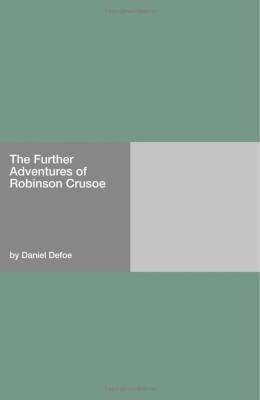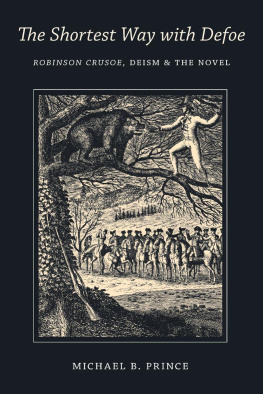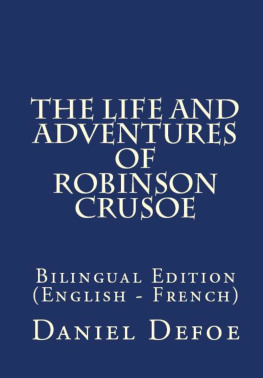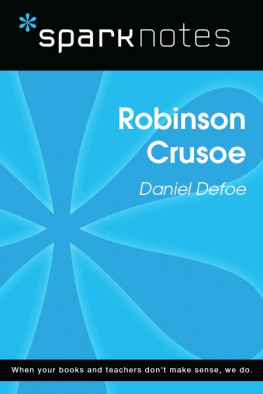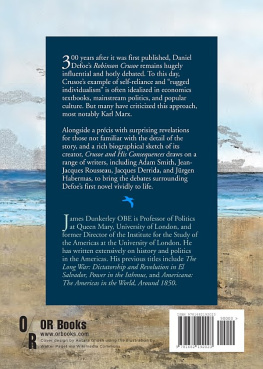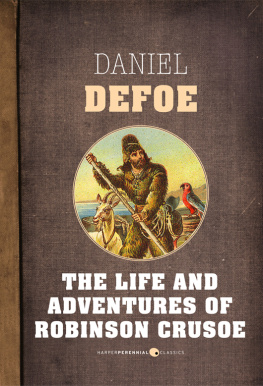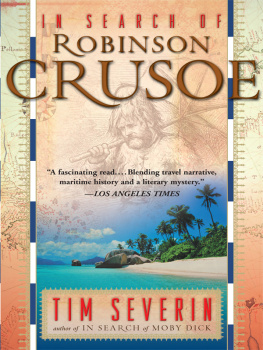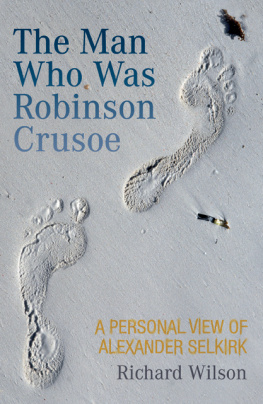Crusoe, Castaways and Shipwrecks in the Perilous Age of Sail
in the Perilous Age of Sail
Dedicated to Heather Williams and Karyn Burnham at Pen & Sword Books for their incredible patience and help in getting my books into print.
Crusoe, Castaways and Shipwrecks in the Perilous Age of Sail
in the Perilous Age of Sail
Mike Rendell
First published in Great Britain in 2019 by
Pen & Sword History
An imprint of
Pen & Sword Books Ltd
Yorkshire - Philadelphia
Copyright Mike Rendell, 2019
ISBN: 978 1 52674 747 1
eISBN: 978 1 52674 748 8
Mobi ISBN: 978 1 52674 749 5
The right of Mike Rendell to be identified as Author of this work has been asserted by him in accordance with the Copyright, Designs and Patents Act 1988.
A CIP catalogue record for this book is available from the British Library.
All rights reserved. No part of this book may be reproduced or transmitted in any form or by any means, electronic or mechanical including photocopying, recording or by any information storage and retrieval system, without permission from the Publisher in writing.
Pen & Sword Books Ltd incorporates the Imprints of Pen & Sword Books Archaeology, Atlas, Aviation, Battleground, Discovery, Family History, History, Maritime, Military, Naval, Politics, Railways, Select, Transport, True Crime, Fiction, Frontline Books, Leo Cooper, Praetorian Press, Seaforth Publishing, Wharncliffe and White Owl.
For a complete list of Pen & Sword titles please contact
PEN & SWORD BOOKS LIMITED
47 Church Street, Barnsley, South Yorkshire, S70 2AS, England
E-mail:
Website: www.pen-and-sword.co.uk
or
PEN AND SWORD BOOKS
1950 Lawrence Rd, Havertown, PA 19083, USA
E-mail:
Website: www.penandswordbooks.com
Preface
We live in an age which seems to like romanticising the whole idea of being cast away in a distant land, stripped of all the trappings of modern civilisation. We are fascinated with the castaway theme. Think of Desert Island Discs running on BBC radio for well over seventy-five years (it was first broadcast in January 1942). On the silver screen, think of Swiss Family Robinson , a Walt Disney film made on the Caribbean island of Tobago. It was based on a novel published in 1812, entitled Der Schweizerische Robinson and tells the story of a Swiss family shipwrecked in the East Indies en route to Port Jackson, Australia. Apart from this 1960 film, there have been at least five other mainstream films of the same name, half a dozen TV series, and six made-for-TV movies. And in all these versions the Robinson in the title shows that the story is part of the genre inspired by Robinson Crusoe.
Think of the various film versions of Mutiny on the Bounty most famous, perhaps, is the 1962 version starring Trevor Howard and Marlon Brando. There have been other versions, one in 1935 with Charles Laughton and Clark Gable, which slightly over-shadowed In the Wake of the Bounty , made in Australia three years earlier, and which marked the screen debut of a young Errol Flynn. There was also a remake in 1984 starring Anthony Hopkins and Mel Gibson. All tell the true tale of Captain Bligh, cast adrift by Fletcher Christian in 1789. A TV mini-series in 2017 tried to recreate the voyage, examining the tensions between the re-enactors as they followed in the footsteps of Bligh and his eighteen fellow castaways. The original journey, travelling over 3500 nautical miles to East Timor in just forty-seven days in an open boat, stands out as one of the most remarkable examples of seamanship and survival ever told whereas the re-creation could not avoid the fact that the castaways had a support vessel (complete with radios, charts, food and emergency medical back-up and supplies) trundling on behind them, just out of sight of the TV cameras. Surely the whole essence of Blighs courageous voyage was that he never knew he would succeed? He was likely to succumb to starvation, dehydration, storm, shipwreck or further mutiny at any moment. Live with that for nearly seven weeks, and you begin to appreciate the single-minded even bloody-minded determination so lacking in the follow-up.
TV producers like castaways. Remember the programme Castaway 2000, in which the BBC followed some three dozen men, women and children as they struggled to build a community on the remote Scottish island of Taransay? Survival expert Ray Mears has made series after series based on bushcraft and survival techniques, backed up with books and public appearances. Chief Scout Bear Grylls has made numerous films and TV programmes on wilderness survival including a handful of series of The Island with Bear Grylls , featuring groups of adventurers cast away on a Pacific Island.
And then there are the celebrity indulgences famous faces abandoned on remote islands, while waiting TV cameras note how they cope with hardship imagined or real. Way back in 1971, model and actress Julie Ege did what was little more than a series of photo-shoots, wearing a bikini, while supposedly stranded on the island of Abaco in the Bahamas. Then we had a television programme featuring the delectable Joanna Lumley, cast adrift on an island off Madagascar in 1994, in which she bravely made a pair of cave shoes out of her bra. More recently we had Robson Greene in In search of Robinson Crusoe stranded on North Guntao Island in the South China Seas even if the idea of being left alone was slightly ruined by the obvious presence of a TV crew, a resident doctor and emergency supplies. From memory he lasted less than three hours before he had to be rescued.
Even Im a CelebrityGet Me Out Of Here! pays lip service to the idea of survival, although the worst thing that usually happens is a few broken finger nails and bruised egos, offset by a much hoped-for boost to a flagging TV career.
Nevertheless, it reflects the public fascination with going without going without comfort, going without food, going without all the things that we take for granted in modern society. The more we become dependent on technology, the more we distance ourselves from basics: a whole generation equates micorowaving pre-prepared foods with real culinary skills, and is accustomed to thinking that using an app on a mobile phone is a substitute for actual knowledge and ability. Remove the technology - will we cope? Perhaps these programmes are an attempt to peel back some of the veneer and to show how we might cope in a post-apocalypse world or perhaps it is just cheap, mindless entertainment. Whatever; it is an enduring genre. And all of it derives from the original story of Robinson Crusoe , written three centuries ago.
The theme lives on as science fiction in the 2015 Ridley Scott film The Martian starring Matt Damon and underlies the film Castaway (2000). It starred Tom Hanks as a FedEx employee stranded on a Pacific Island after a plane crash which kills all his companions. In practice it was filmed on the Fijian island of Mamanuca and Tom Hanks commented that he wanted to examine the concept of four years of hopelessness, in which you have none of the requirements for living food, water, shelter, fire and company. Many assume that it was based on real events it was not, and has a screenplay written by William Broyles Jnr. The film does not have a Man Friday but it does have a Wilson volleyball, which becomes a personified companion during the four years in which the Hanks character is stranded and alone. It also goes rather further than most in the genre to examine the mental as well as the physical problems faced by castaways. How does hope survive, often against all reason? What happens when all hope is gone? How do people survive with nothing but their own company? And if they survive, how do they cope with returning to the modern world?






